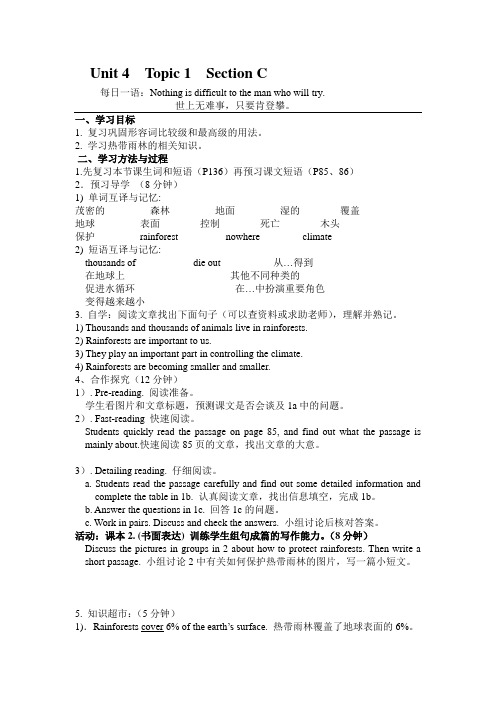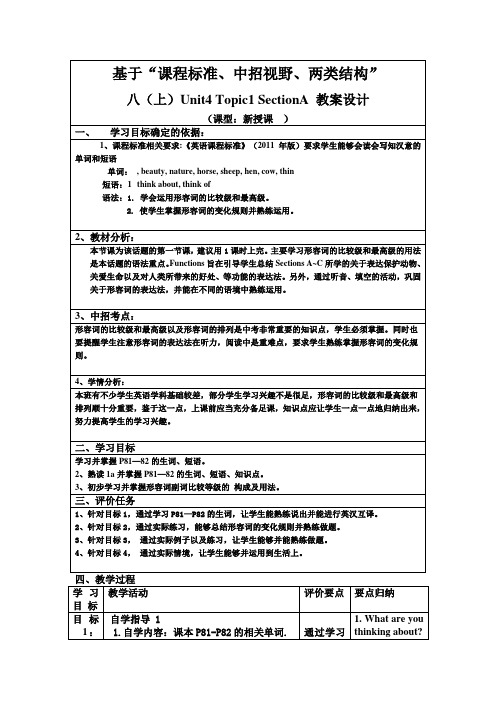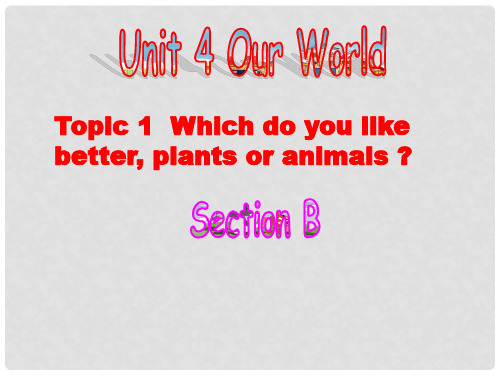八年级英语上册Unit4 Topic1精品学案 整个话题8页 最新仁爱版
- 格式:doc
- 大小:128.50 KB
- 文档页数:8

Unit 4 Topic 1 Section C每日一语:Nothing is difficult to the man who will try.世上无难事,只要肯登攀。
一、学习目标1. 复习巩固形容词比较级和最高级的用法。
2. 学习热带雨林的相关知识。
二、学习方法与过程1.先复习本节课生词和短语(P136)再预习课文短语(P85、86)2.预习导学(8分钟)1) 单词互译与记忆:茂密的_________森林_________地面_________湿的________覆盖______地球_________表面________控制________死亡________木头________保护_________rainforest _________nowhere ________climate_________2) 短语互译与记忆:thousands of ________ die out ________ 从…得到________在地球上________________ 其他不同种类的___________________促进水循环___________________ 在…中扮演重要角色______________变得越来越小___________________3. 自学:阅读文章找出下面句子(可以查资料或求助老师),理解并熟记。
1) Thousands and thousands of animals live in rainforests.2) Rainforests are important to us.3) They play an important part in controlling the climate.4) Rainforests are becoming smaller and smaller.4、合作探究(12分钟)1). Pre-reading. 阅读准备。
学生看图片和文章标题,预测课文是否会谈及1a中的问题。




仁爱版英语八年级上册Unit 4 Topic 1《Which do you like better,plants or animals》(SectionC)教学设计一. 教材分析本课选自仁爱版英语八年级上册Unit 4 Topic 1 Section C。
本节课主要讨论了关于植物和动物哪个更好的话题。
通过本节课的学习,学生能够进一步了解植物和动物的特点,提高他们的英语交际能力。
教材内容丰富,插图清晰,贴近学生生活,有利于激发学生的学习兴趣。
二. 学情分析八年级的学生已经具备了一定的英语基础,对于日常生活中的话题能够进行简单的交流。
但是,他们的英语听说能力还有待提高,特别是在口语表达方面。
因此,在教学过程中,需要注重培养学生的听说能力,激发他们的学习兴趣。
三. 教学目标1.知识目标:–能够听懂、会说、会读本节课的主要单词和句型。
–能够运用所学知识进行简单的交流。
2.能力目标:–提高学生的听说能力,使他们能够流利地用英语进行对话。
–培养学生的阅读习惯,提高他们的阅读理解能力。
3.情感目标:–培养学生热爱大自然,关注生态环境的意识。
–增强学生的团队协作精神,提高他们的人际沟通能力。
四. 教学重难点•掌握本节课的主要单词和句型。
•能够运用所学知识进行简单的交流。
•正确运用情态动词“which”进行比较级的选择。
•在实际情景中运用所学知识进行流畅的对话。
五. 教学方法1.任务型教学法:通过设定各种任务,让学生在完成任务的过程中运用所学知识,提高他们的实际应用能力。
2.情景教学法:创设各种真实的场景,让学生在情景中练习英语,增强他们的交际能力。
3.小组合作学习:鼓励学生进行小组讨论,培养他们的团队协作能力和沟通能力。
六. 教学准备1.教学课件:制作精美的课件,辅助教学。
2.教学图片:准备与课文内容相关的图片,帮助学生更好地理解。
3.教学视频:寻找相关的教学视频,丰富教学手段。
4.录音设备:准备录音设备,用于播放音频材料。

Unit4Topic1SectionB教学设计Ⅰ.Material analysisSection B的主要教学活动为1a和3。
本节课通过Wang Wei,Michael,Jane,Kangkang之间的对话,引出谈论动植物的话题。
在这部分学习中,教师可以借助图片对比的方式好好培养学生爱护动植物的意识。
也通过动物、植物更喜欢哪个的表述的句子,继续学习形容词比较级和最高级。
形容词比较级和最高级是本话题的重点也是难点,所以老师们在设计课堂的时候应该通过游戏、竞赛、小组合作等方式激发学生的参与热情,通过身边的例子吸引学生的注意力。
Ⅱ.Teaching aims1.通过本课学习,在口语表达的时候能根据意群或逗号适当地停顿。
2.能在老师的引导下,听出/r//l/之间的区别。
3.能掌握形容词的比较级和最高级的用法。
4.能运用本课所学语言,对某些事物进行比较。
5.能正确朗读课本的文本材料,准确把握语音、语调及停顿。
6.能正确地运用书面表达写出有关比较级和最高级的文章。
Emotional aims:通过对Section B的学习,要求学生明白动植物能带给我们欢乐、使我们的世界更美丽,保护动植物,让我们和花鸟鱼虫和谐生存。
Ⅲ.The key points and difficult pointsKey points:1.复习比较级和最高级的用法。
2.从重音、停顿等方面培养自己的口语。
3.复习/r//l/之间的发音区别。
Difficult points:1.比较级和最高级在句子当中的正确使用。
2.根据音标写单词的时候容易漏掉不发音的字母。
Ⅳ.Learning strategies:比较级这一语法比较难,在学习的时候多想想自己和朋友的变化,试着多用英语夸夸同学的进步,不仅能增进感情,还能练习语法点。
Ⅴ.Teaching aidsComputer multimedia projector,pictures,cards with table Ⅵ.Teaching proceduresStep InteractionpatternStudent activity Teacher activityLead-in (5minutes)1.The wholeclass work2.The wholeclass workand individualwork1.Focus their attentionon the teacher.2.Students look at theBeautiful pictures happily.When they see the uglypicture,they may feel bad.All of the students like thebeautiful one.1.Greet students ready forlearning.2.Show2pictures tostudents.One isbeautiful.There aremany animals and flowers init.People play with their petshappily.The other one is veryugly,like pollution.Askstudents,“Which one do youlike better?”Lead-in (5minutes)3.The wholeclass work4.The wholeclass work5.Group work6.Individualwork3.Listen to the teacher.4.Students study thepronunciation andspelling of“rose”.5.Students answer thequestions withcomparative andsuperlative degrees.The answer may be“Ilike...better,because it iscute/beautiful...”6.Answer questions andreview comparativeand superlative degrees.cate students toprotect environmentto give the animals andflowers a nicer“home”.4.Show the4picturesof1a to students.Teachthe new word“rose”here.5.Ask students,“Whichdo you like better,plants or animals?Why?”6.Invite students to answerthis question.New words and sentences (10minutes)1.Individual work2.Individual work3.Individual work4.The wholeclass work1.Students listen to1a andwrite down the answers.They can hear“I like animalsbetter./I like plants better.”2.Listen to1a again andfinish1b.3.Students share theiranswers after theexamples.4.Read after the tapesentence by sentence.Marksome pause ifnecessary.Finish1a.1.Play1a.Show twoquestions to students,“Which does Michael likebetter,plants or animals?”“Which does Wang Wei likebetter,plants or animals?”2.Check the answersand play1a again.Askstudents to finish1b.3.Invite students toshare their answerswith a whole sentence.E.g.Wang Wei likesroses better.He thinksroses are the nicest ofall the flowers.New words and sentences (10minutes)5.Group work6.Individual workand groupwork7.Pair work5.Students read thepassage in groups.Groupleaders check whether all themembers can read thepassage and help those whocan’t read.6.Students read1acarefully and fill in theblanks.Students had betterfill in the blanks according totheir memories.7.Report the passage totheir partners.4.Play1a sentence bysentence.Ask studentsto pay attention to thepronunciation and thepause.5.Give students severalminutes to read thepassage.6.Show1c to students.Askstudents to read1acarefully and fill in theblanks.anize the students toshare the answers.Grammar (10minutes)1.The wholeclass workand groupwork2.Pair work3.Individualwork1.Each student shouldsurvey four students as quicklyas possible.They can use thesentences in1a.A:Which do you like better,plants or animals?B:I like...better.A:Why?B:Because it is the...In this part students shouldlearn the team work.2.Students put theirhands high.Make theconversations.3.Volunteers report theirresults like this:Jacklikes animals better,because he thinks animals arevery cute.Peter likes…best,because...Ann likes bothplants andanimals because...Finish2.1.Play a game.Whichgroup is the fastest?Hand out students a tablelike this:Name like reasonTell students the game rules:Each student shouldinterview four students.Students should do it quickly.If you finished,you can helpyour group members.Afterall of the group membersfinished,it is really finished.2.Invite students to practice theconversations.3.Invite students to report theresults they surveyedaccording to the table.Practice (10minutes)1.The wholeclass workand individualwork2.Individual work3.The wholeclass work4.The wholeclass workand individualwork5.Group workand individualwork6.Group workand individualwork7.Group work8.The wholeclass work9.The wholeclass work andindividual work1.Students spell the words2.Write down the wordsindividually.Pay attention tothe alphabet which isn’tpronounced in the words.3.Read and rememberthese words accordingto the pronunciation.4.Read these words afterthe tape.5.Read4a in groups.6.Read these words,paying attention to the keypoints.7.Read the sentences,paying attention to thepauses.8.Read after the tape,imitating thepronunciation and thepauses.9.Students listen to theStudent,and find out themistakes.1.Show the pictures in3tostudents and ask them tospell the words.2.Ask students to writedown the words individually3.Play3.Remind studentsTo check the vowels.4.Show4a to students.Play4a.Ask students to readafter the tape.5.Give students1minute toread4a.find some ways topronounce/r/and/l/well.6.Teacher teaches the keypoints when studentspronounce/r/and/l/.7.Show4b to students,encouraging them to readthe sentences in groups.8.Play4b and remindstudents,“You often pausewhen you see a comma orfinish a sense group.”9.Invite students to read inthe class.Summary (7minutes)1.The wholeclass workand groupwork2.The wholeclass work3.The wholeclass work4.The wholeclass work1.Students stand up quickly andpraise theirclassmates like this:I thinkLisa is taller than last year.Ithink John is more handsomethan before.I think Jordan isthe funniest in our class.2.At this time,students are veryhappy.Summarize the rulesof comparative andsuperlative degrees.3.Students read thesummaries.They can workin pairs to practice like adialogue.4.Students finish theirhomework after class.Review what theylearned before andpreview Section C.1.Play a game.Encouragestudents to praise theirclassmates with comparativeor superlative degrees.2.Give smiling faces tostudents and sum up:Ithink you are smarter thanlast year.Y ou are thecleverest students in theworld.3.Teacher sums up the keypoints:T:Which do youlike better,plants oranimals?S:I like...better.T:Why?S:Because they are cuterthan other animals.4.Homework:Take the table homewhich the teacher gavethem just now.Write apassage to introduce theirfriends’likes and reasons.Teaching ReflectionAfter this class,students can use comparative and superlative degrees easily.They can master the target language:Which do you like better,plants or animals?I like...better.Why?Because...However,there are many mistakes in grammar.If teacher designs more real situations for students to practice the grammar,it can be better.Ⅶ.Blackboard design。
UNIT 4 Our WorldTOPIC 1 What's the strongest animal on the farm?Section A教案教学目标(Objectives):1.确保学生认识和理解一些根本单词的意义和简单口头运用〔To learn the meaning and simple usages of some words and phrases〕。
需要掌握的词组:animalStrongestOn the farm2.学习使用本单元重点句型及表达〔To use the typical sentences to express〕。
需要掌握的句型:Do you like countryside?No, I don’t. I like city.Yes, I do.…3.鼓励学生大胆发言及表达〔To encourage the students to express bravely〕。
4.培养学生对英语学科的兴趣〔To make the students interest in English learning)。
5.增强学生听说读写译的能力〔To strengthen the ability of listening, speaking, reading, writing and translating)。
教学重点〔Key Points):在学习了单词的根底上,以单词为载体,进展主要句型的学习,并了解其中的语法现象,根据具体情境,学会交流对话,侧重句型语法学习,交际意向和课外拓展为重点。
教学方法:游戏,音频,情景教学法,Pair-work两人小组活动,Group-work小组活动,多媒体辅助教学。
教学难点:学生处于初中阶段,对英语有了初步了解,词汇储藏较少,对于学生的要求重点是在会读会说的根底上,能掌握一些根本单词的拼写和造句,了解一定的语法内涵,与人进展简单沟通交流。
Unit4 Topic1 SectionA 精品学案学习目标:1.掌握形容词比较级和最高级的变化规则及用法。
2.通过谈论大自然的美丽风光,增强学生对自然的热爱和提高保护自然的意识。
课前预习:一、从文中找出下列短语。
考虑__________乡村生活_____________________安静的多________________暑假__________享受大自然的美丽风光_____________________在那儿___________所有中最好看的_____________________一定_________在农场______________过着更好的生活____________最胖并且最懒惰的动物____________二、语言点导学:1.读1a,从中找出四处形容词的比较级,并试着写出它们的原级;如,fresher--fresh,________________,________________, _____________________。
2.1a的语言点导学:①Hey, Wang Wei, what are you thinking about? 译:__________________think about 意为“思考,考虑……”,后接名词,代词或动名词。
如:I’m thinking about _____(go) there some day.我在考虑有一天去那儿。
链接:think over仔细考虑think of…认为……,想起…….有时可以与think about 互换。
②I think the countryside is much quieter than the city.译:______________________副词much可修饰形容词的比较级,表示比较的程度“…. 得多”。
可修饰比较级的副词还有:a lot ….得多;a little 一点儿,even更,far更。
如:He is ______ ______ earlier than I.他比我早得多。
I am _____ _______older than him.我比他大一点。
3.读2b表格中的词,试着归纳。
参考124页注释填完表格2b。
写出下列形容词的比较级和最高级:fresh______ ________strong_______ _________lazy_______ ___________small ________ _________big _______ _______fast ______ _________good(不规则)______ _________三.课后巩固:(一)根据汉语或首字母提示完成句子:1.My grandparents keep a lot of _______ (绵羊) in the countryside.2.Trees can keep the air much _______ (清新)。
3.They are _____ _______ (考虑)buying a new car.4.Playing games _______ ______ (一定)fun.5.There are many g________ in the river. How happily they’re swimming!6.People can enjoy n_______ in the countryside.7.The air is f_____ and the sky is blue there.(二)用括号内所给词的正确形式填空。
8.My house is the ______(big) of all the houses.9.The Yangtze River is the _______(long)river in China.Unit4 Topic1 SectionB 精品学案学习目标:1.学习多音节形容词比较级和最高级的变化规则及用法。
2.谈论自然界中的动植物,让学生初步了解它们之间的关系。
3.引导学生增强对大自然的热爱,提高他们保护动植物的意识。
课前预习:一、从文中找出下列短语。
更喜欢__________饲养宠物狗_____ _____ _____ ______使某人快乐____ ______ ______和某人玩耍____ ___ ____所有花中最好看的________________________唱歌给某人听______________众所周知____________对某人很重要____________________两者都__________和某人分享某物_______________________最喜欢____._______写出下列形容词的汉语及比较级和最高级:(1)interesting__________ ____________ ___________(2)beautiful__________ _____________ _____________(3)important __________ _____________ ________(4)friendly _________ ___________ __________(5)useful _________ ______________ ___________(6)clever ___________ __________ __________(8)lovely ____________ _____________ ________(9)cute _______ ______ _____(10) good _____ ______ ____二、语言点导学:1.I think roses are the nicest of all the flowers.译:_______________________在表示最高级的句子中,如果前后的名词是属同类的,则范围前用of;属不同类时用in。
如:Tom is the tallest ___ these children. Tom is the tallest ___ our class.2.As we know ,they are both important to us.众所周知,它们对我们很重要。
(1)as we know= it is well know that 众所周知。
如:_____ _____ ____, there are many kinds of animals all over the world.众所周知,全世界有许多种动物。
(2)be important to sb.对某人来说很重要。
如,Water is important ____ ______.水对我们很重要。
3.We share the same world with them.我们和它们共享这个世界。
share sth. with sb.与……分享......,和……共用……如,You can_____ the umbrella ______ me.你可以和我共用一把伞。
三.课后巩固:(一)根据句意及首字母提示补全单词:1. Mr. Li made faces to m______ the baby laugh .2. People like r_____a lot ,because they usually stand for love.3.—Which kind of animals do you like better ,frogs or s______?—I like frogs better because they are friends of farmers.4. Little Tom is very c _____.We all like him.5. Wu Peng does b________ in English than me.(二)单项选择:6. The girl is _______ than the other girls.A. more carefulB. much carefulC. the most carefulD. careful7.Fresh air is important _____ us.A. inB. ofC. toD. onUnit4 Topic1 SectionC 精品学案学习目标:(7)复习形容词比较级和最高级的用法。
(8)谈论地球上热带雨林的基本状况及它们对于地球上生物的重要性。
(9)增强学生保护森林资源的意识。
课前预习:一、从文中找出下列短语。
茂密的森林_____ _____多雨____ ____ _____在世界上热带地区_____________________________________________________ 地球表面____ ______ ______数以千计_______ ___离地面30多米高_____________________________地球之肺_______________________储存水分____ ___ _____使空气更清新,更干净________________________________维持水循环_____ ____ ____ _______灭绝_____ _____在某事中起重要作用____________________________________保持自然的美丽_______________________________例如____ ____越来越小_______________________保护某人/某物免于________________________________二、语言点导学:(1)Rainforests cover 6% of the earth’s surface.译:_________________________________________cover v.覆盖如:Water ______ most parts of the earth.水覆盖着地球大部分地区。
cover …with…用……覆盖…… 如:The mother ______her baby ____a blanket just now.妈妈刚给她的宝宝盖上了毛毯。
(2) Thousands and thousands of animals live in rainforests .译:____________________________________________thousands and thousands of 成千上万的。